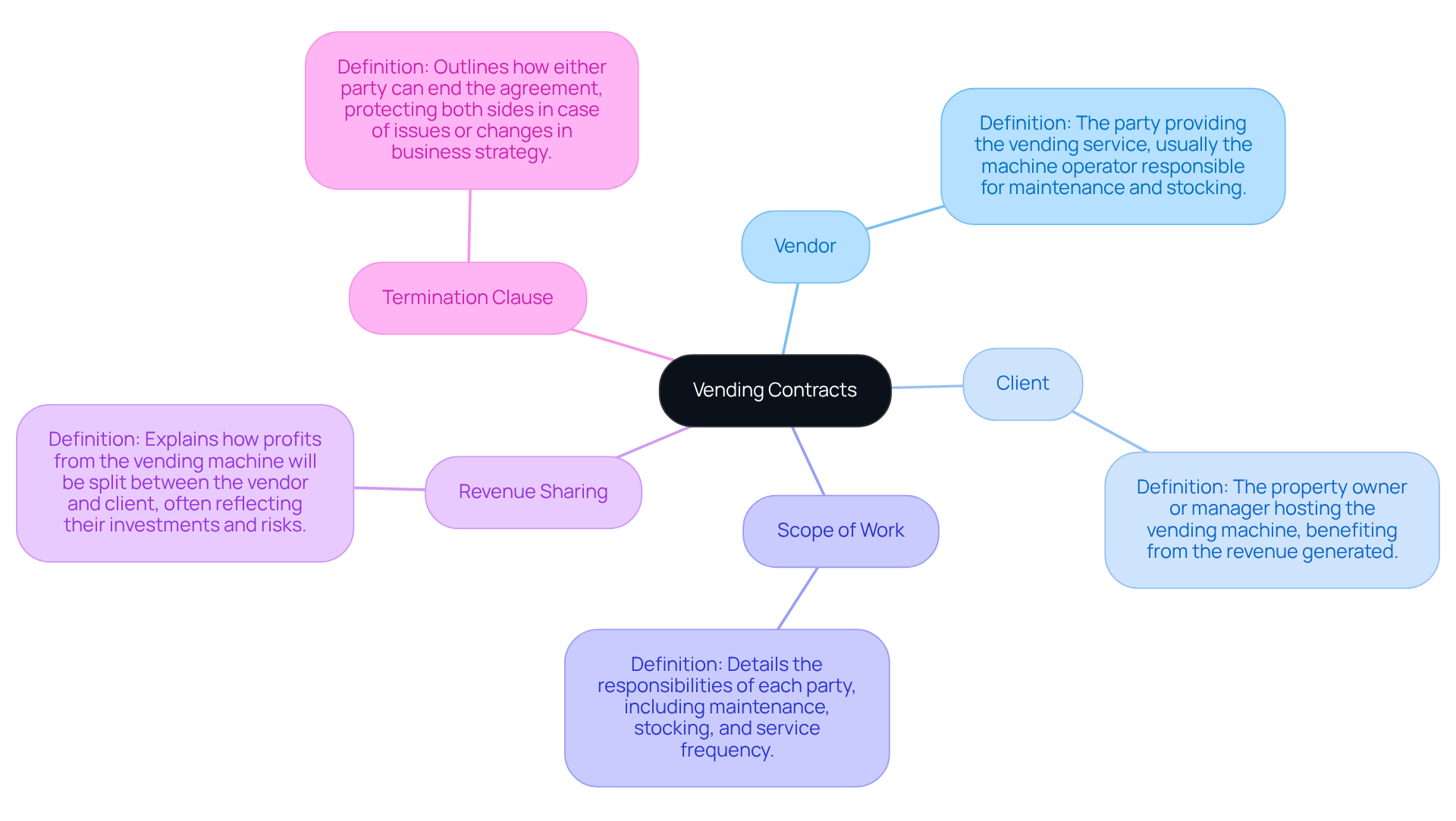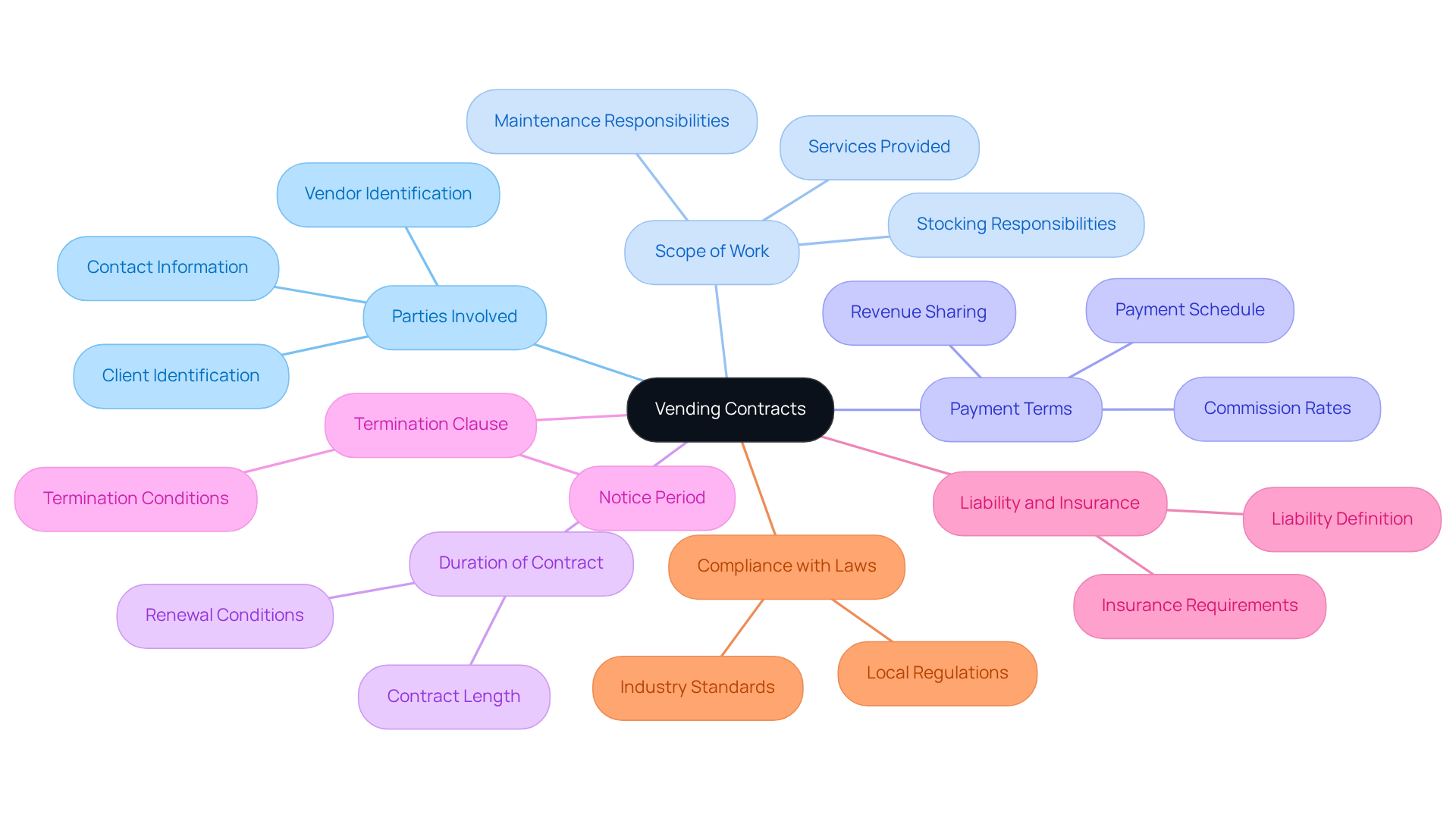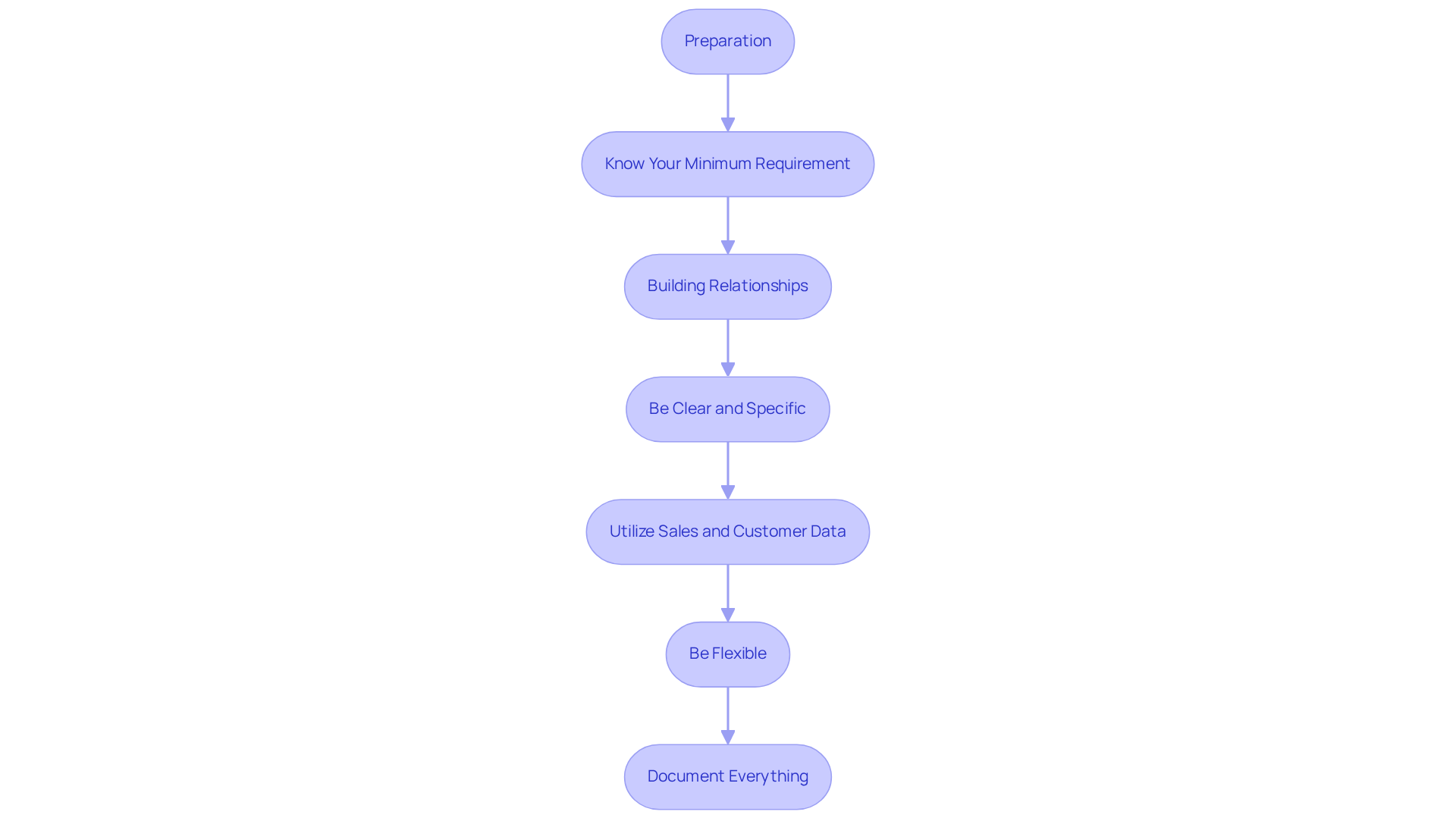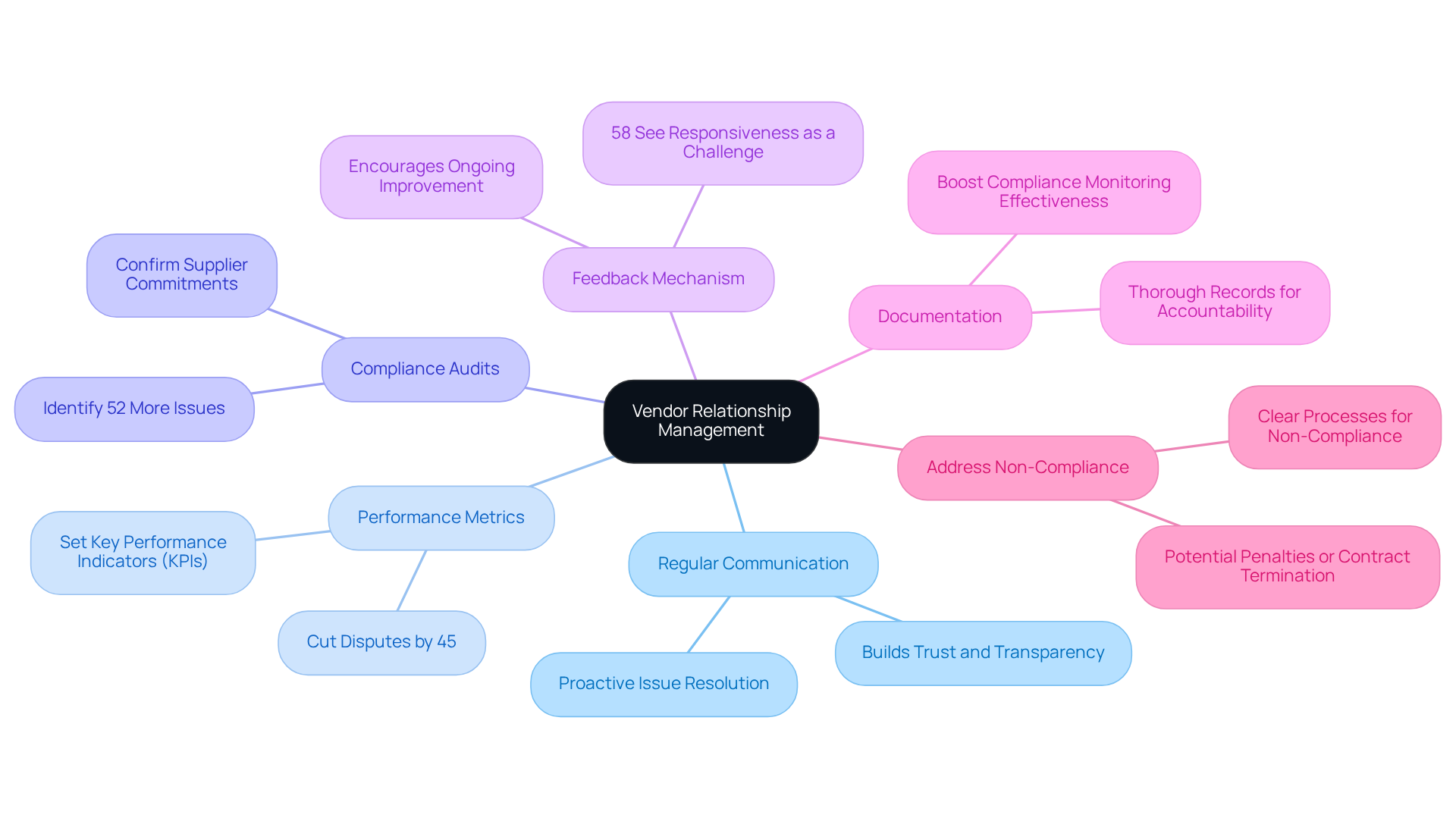Overview
So, you're diving into vending contracts? That’s a smart move! Understanding the key components and strategies is essential for mastering this area. It’s all about knowing the important terms, negotiating like a pro, and making sure you’re compliant.
Here’s the thing: you want to pay attention to critical elements like the scope of work and revenue sharing. These details can really make or break your vending operations. Plus, having some solid negotiation strategies and compliance management tips up your sleeve can boost your operational success and profitability.
Let’s break it down:
- Start by familiarizing yourself with those key terms.
- Practice your negotiation skills—this will help you secure better deals.
- Don’t forget about compliance; it’s crucial for keeping everything running smoothly.
You’ve got this!
Introduction
Vending contracts are kind of the backbone of how successful vending operations run. They define the relationship between machine operators and property owners, and let’s be honest, understanding what goes into these agreements can really make a difference. It not only makes negotiations smoother but can also boost profits for everyone involved.
But here’s the thing: navigating the ins and outs of these contracts can feel overwhelming. What are the key elements that can truly make or break a deal? In this article, we’ll break it down and explore the critical components and negotiation strategies that can help property managers master vending contracts and optimize their business outcomes. So, let’s dive in!
Define Vending Contracts: Key Concepts and Terminology
Vending contracts are important legal agreements between machine operators and property owners or managers. They lay out the terms of how everyone works together. Now, getting a grip on the lingo in vending contracts is key for smooth negotiations and operations.
Let’s break it down:
- Vendor: This is the party providing the vending service, usually the machine operator who takes care of maintaining and stocking the machines.
- Client: That’s the property owner or manager hosting the machine, who benefits from the revenue it brings in.
- Scope of Work: This part spells out what each party is responsible for, like machine maintenance, product stocking, and how often services happen. It’s all about keeping things clear.
- Revenue Sharing: Here’s where it gets interesting. This section explains how profits from the vending machine will be split. It often reflects how much each party has invested and the risks they’ve taken. For example, a common model might give 60% to the vendor and 40% to the client, creating a win-win situation.
- Termination Clause: This part outlines how either party can end the agreement, protecting both sides if things go south or if business strategies change.
Getting familiar with these terms not only helps you navigate the ins and outs of vending contracts but also boosts your ability to strike good deals. Did you know that operators who clearly outline revenue-sharing terms often see profit margins jump by 20% to 25%? By mastering the language of these agreements, property managers can ensure smoother operations and better financial outcomes. So, why not take a little time to get to know this stuff? It could really pay off!

Identify Essential Components of Vending Contracts
Let’s discuss vending contracts. You know, that can make or break your business? Here are some essential components you should keep in mind:
- Parties Involved: First off, make sure you clearly identify who the vendor and client are. Include contact information so everyone knows how to reach each other — accountability is key.
- Scope of Work: Next, define the services provided. Be specific about maintenance and stocking responsibilities to avoid any misunderstandings down the line.
- Payment Terms: Now, let’s get into the money. Specify how and when payments will be made. If there’s a revenue-sharing agreement, mention that too — it usually ranges from 5% to 25% of the revenue generated.
- Duration of Contract: How long is the agreement? Typically, it’s between 1 to 5 years. Don’t forget to outline conditions for renewal; this will give you clarity on your long-term commitments.
- Termination Clause: What happens if you need to end the agreement? Outline the process, including notice periods (often around 60 days) and any conditions. This protects both parties' interests.
- Liability and Insurance: You’ll want to define liability for damages or losses. Also, require appropriate insurance coverage to mitigate risks associated with sales operations.
- Compliance with Laws: Finally, ensure that your contract adheres to local regulations and industry standards. This step safeguards you against any potential legal issues.
Integrating these elements not only reduces risks but also promotes a smooth operational relationship within vending contracts. And hey, that can really boost your chances of profitability in the retail business! So, take a moment to review your contracts and make sure you’ve got these bases covered.

Negotiate Terms: Strategies for Property Managers
When it comes to , property managers can really benefit from a few effective strategies. Let’s break it down.
- Preparation is key. You want to do your homework—research the market and get a good grasp on the value of the service you’re looking to negotiate.
- Next up, know your minimum requirement. Before diving into discussions, pinpoint what your least acceptable conditions are. This way, you won’t get caught off guard.
- Don’t underestimate the power of building relationships. Establishing rapport with your vendor can create a more collaborative environment for negotiation, making it easier to find common ground.
- Now, when you talk, be clear and specific. Clearly articulate what you need and expect to avoid any misunderstandings down the line.
- Also, it’s smart to utilize any information you have on sales performance and customer preferences. This data can really help support your position and conditions.
- And hey, don’t forget about flexibility. Being open to alternative solutions can benefit both parties. For instance, consider adjusting revenue-sharing percentages if it makes sense.
- Finally, make sure to document everything. It’s crucial to have all agreed-upon terms recorded in the final agreement to prevent disputes later.
By employing these strategies, you can negotiate vending contracts that genuinely align with your business goals. So, what do you think? Ready to give these tips a shot?

Ensure Compliance: Monitoring and Managing Vendor Relationships
To keep things running smoothly with your vendors, here are some straightforward strategies you can put into action:
- Regular Communication: Let’s face it, keeping the lines open with your suppliers is key. When issues pop up, you want to tackle them head-on. This proactive approach builds trust and transparency. As Erich Kron points out, knowing what information is processed and how long it’s stored is crucial for managing suppliers effectively.
- Performance Metrics: It’s a good idea to set some key performance indicators (KPIs) to see how your suppliers are doing against the agreed terms. This way, you can evaluate their performance objectively. Did you know that having clear, measurable KPIs can cut disputes by 45%? That’s a big deal.
- Compliance Audits: Regular audits are a must. They help you confirm that suppliers are sticking to their commitments. Plus, these checks can reveal compliance gaps and help you dodge potential risks. Organizations that conduct regular audits find 52% more issues before they escalate — definitely something to consider.
- Feedback Mechanism: Setting up a solid feedback system for your suppliers is essential. This encourages ongoing improvement and ensures they’re attentive to your needs. Interestingly, 58% of compliance pros see measuring supplier responsiveness as their biggest challenge. So, a feedback loop can really help.
- Documentation: Keep thorough records of all your communications, performance reviews, and compliance checks. This isn’t just busywork; it’s vital for accountability and can serve as evidence if disputes arise. Detailed records can significantly boost your compliance monitoring effectiveness.
- Address Non-Compliance: It’s important to have a clear process for dealing with non-compliance, including potential penalties or even contract termination. This clarity helps everyone understand the stakes involved in meeting contractual obligations.
By managing your supplier relationships with these strategies, you can ensure that contracts are honored and create a win-win situation. Statistics show that organizations with strong compliance practices face far fewer vendor-related incidents. For example, using a vendor compliance checklist with weighted scoring can standardize evaluations and improve oversight. So, let’s get started!

Conclusion
Mastering vending contracts is super important for both vendors and property managers. These agreements really are the backbone of successful vending operations. When you understand the nitty-gritty details—from defining key terms to negotiating favorable conditions—you ensure that everyone involved is on the same page and can work together for mutual benefit.
Here’s the thing: the article laid out the essential components of vending contracts. We’re talking about:
- Identifying the parties
- Scope of work
- Payment terms
- Duration
- Compliance requirements
Clear communication and documentation throughout the negotiation process are key. They help avoid misunderstandings and strengthen the operational relationship. Plus, effective strategies for monitoring vendor compliance were highlighted. Regular communication, performance metrics, and feedback mechanisms can really boost accountability and improve overall performance.
But the good news is that in a competitive landscape, well-structured vending contracts are a game changer. They not only protect everyone’s interests but also open the door to increased profitability and smoother operations. So, property managers and vendors, take the time to fully understand these agreements. Leverage the insights shared here to create contracts that stand the test of time. Embracing these practices will lead to stronger partnerships and greater success in the vending business. Let’s make it happen!
Frequently Asked Questions
What are vending contracts?
Vending contracts are legal agreements between machine operators (vendors) and property owners or managers (clients) that outline the terms of their collaboration regarding vending services.
Who is considered the vendor in a vending contract?
The vendor is the party providing the vending service, typically the machine operator responsible for maintaining and stocking the vending machines.
Who is the client in a vending contract?
The client is the property owner or manager hosting the vending machine, who benefits from the revenue generated by it.
What does the Scope of Work refer to in a vending contract?
The Scope of Work specifies the responsibilities of each party, including machine maintenance, product stocking, and the frequency of services provided.
What is the Revenue Sharing section in a vending contract?
The Revenue Sharing section explains how profits from the vending machine will be divided between the vendor and the client, often based on their respective investments and risks.
What is a common revenue-sharing model in vending contracts?
A common model may allocate 60% of the profits to the vendor and 40% to the client, creating a mutually beneficial arrangement.
What is the purpose of a Termination Clause in a vending contract?
The Termination Clause outlines the conditions under which either party can end the agreement, providing protection for both sides in case of changes in business strategies or issues.
How can understanding vending contract terminology benefit parties involved?
Familiarity with vending contract terms helps in navigating negotiations and operations, potentially leading to better deals and increased profit margins, with operators seeing profit increases of 20% to 25% when revenue-sharing terms are clearly defined.
List of Sources
- Define Vending Contracts: Key Concepts and Terminology
- How to start a profitable vending machine business | VendSoft (https://vendsoft.com/vending-machine-business-guide)
- Are Vending Machines Profitable? (2020) | Naturals2Go (https://naturals2go.com/are-vending-machine-profitable)
- Vending Machine Statistics in 2023 - Vending Locator (https://vendinglocator.com/blog/vending-machine-statistics)
- Vending Machine Statistics and Facts (2025) (https://news.market.us/vending-machine-statistics)
- Identify Essential Components of Vending Contracts
- contractscounsel.com (https://contractscounsel.com/t/us/vending-machine-contract)
- 2025 Vending Machine Profit Statistics: How Much Can You Make? (https://smallbizgenius.net/by-the-numbers/vending-machine-profit-statistics)
- Vending Machine Statistics in 2023 - Vending Locator (https://vendinglocator.com/blog/vending-machine-statistics)
- dfyvending.com (https://dfyvending.com/vending-machine-commission-rates)
- Elements of the 'vending subcontract' (https://vendingmarketwatch.com/management/article/10450773/elements-of-the-vending-subcontract)
- Negotiate Terms: Strategies for Property Managers
- Key Statistics in Negotiation for 2024 | Scotwork (https://scotwork.co.uk/thought-leadership/negotiation-statistics)
- Negotiation Statistics 2025 — 60 Key Figures (https://procurementtactics.com/negotiation-statistics)
- rubyhome.com (https://rubyhome.com/blog/property-management-stats)
- profiletree.com (https://profiletree.com/property-management-industry-statistics-and-trends)
- 6 Instances of Statistics Facilitating Negotiation Success - Statistician Zone (https://statisticianzone.com/qa/6-instances-of-statistics-facilitating-negotiation-success)
- Ensure Compliance: Monitoring and Managing Vendor Relationships
- 110 Compliance Statistics to Know for 2025 (https://secureframe.com/blog/compliance-statistics)
- Key Compliance Statistics & Insights For 2025 | Zluri (https://zluri.com/blog/key-compliance-statistics-and-insights-for-2024)
- 10 Vendor Risk Statistics to Be Aware Of - Veridion (https://veridion.com/blog-posts/vendor-risk-statistics)
- Ensuring Vendor Compliance: A Strategic Guide to Vetting Third-Party Partners - Ethico (https://ethico.com/blog/ensuring-vendor-compliance)
- 99+ Essential Third-Party Risk Statistics and Trends for 2024 (https://secureframe.com/blog/third-party-risk-statistics)




